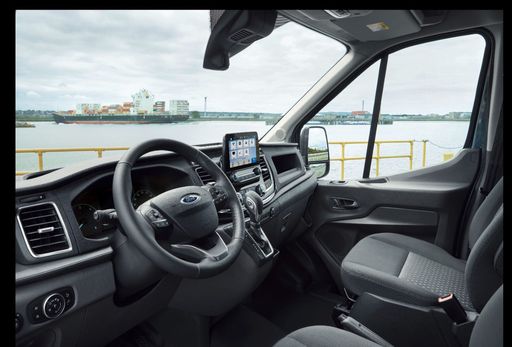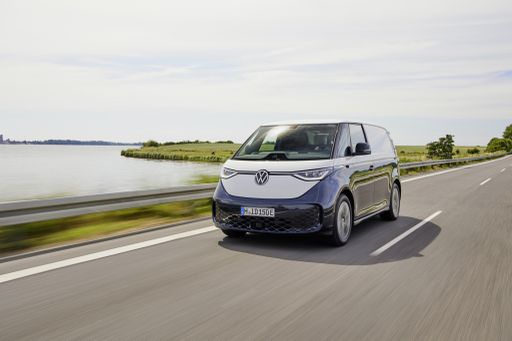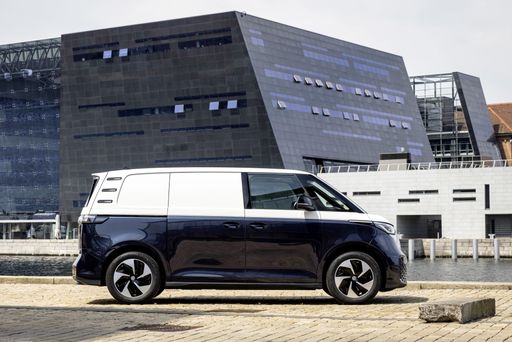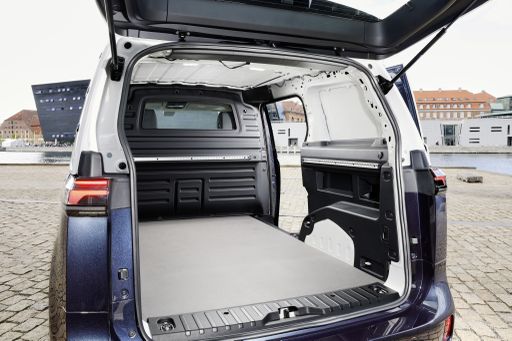Ford Transit Bus VS VW ID. Buzz Cargo
Ford Transit Bus
The Ford Transit Bus is renowned for its robust performance and spacious interior, making it an ideal choice for both commercial and personal use. With its efficient handling and modern design, it effortlessly combines practicality with comfort. Its adaptability and versatility ensure it meets the demands of various driving needs, from urban transport to long-distance journeys.
detailsVW ID. Buzz Cargo
The VW ID. Buzz Transporter represents a bold leap into the future with its innovative electric design and retro-inspired aesthetic. Combining practicality with modern technology, it offers a spacious interior and advanced connectivity features ideal for both urban and long-distance journeys. This vehicle stands as a testament to Volkswagen's commitment to sustainability and forward-thinking mobility solutions.
details @ media.ford.com
@ media.ford.com
 @ media.ford.com
@ media.ford.com
 @ media.ford.com
@ media.ford.com
 @ volkswagen-newsroom.com
@ volkswagen-newsroom.com
 @ volkswagen-newsroom.com
@ volkswagen-newsroom.com
 @ volkswagen-newsroom.com
@ volkswagen-newsroom.com

|

|
|
|
|
Costs and Consumption |
|
|---|---|
|
Price
about 48200 - 52900
£
|
Price
about 43600 - 51400
£
|
|
Consumption L/100km
9.4 - 9.5
L
|
Consumption L/100km
-
|
|
Consumption kWh/100km
-
|
Consumption kWh/100km
19.2 - 20.3
kWh
|
|
Electric Range
-
|
Electric Range
432 - 461
km
|
|
Battery Capacity
-
|
Battery Capacity
59 - 79
kWh
|
|
co2
245 - 248
g/km
|
co2
0
g/km
|
|
Fuel tank capacity
70
L
|
Fuel tank capacity
-
|
Dimensions and Body |
|
|
Body Type
Bus
|
Body Type
Cargo Van
|
|
Seats
8 - 9
|
Seats
3
|
|
Doors
4
|
Doors
4
|
|
Curb weight
2311 - 2385
kg
|
Curb weight
2264 - 2510
kg
|
|
Trunk capacity
0
L
|
Trunk capacity
-
|
|
Length
5531 - 5981
mm
|
Length
4712
mm
|
|
Width
2059
mm
|
Width
1985
mm
|
|
Height
2530 - 2533
mm
|
Height
1932
mm
|
|
Payload
789 - 1162
kg
|
Payload
640 - 753
kg
|
Engine and Performance |
|
|
Engine Type
Diesel
|
Engine Type
Electric
|
|
Transmission
Automatic
|
Transmission
Automatic
|
|
Transmission Detail
Automatic Gearbox
|
Transmission Detail
Reduction Gearbox
|
|
Drive Type
Front-Wheel Drive
|
Drive Type
Rear-Wheel Drive, All-Wheel Drive
|
|
Power HP
130 - 150
HP
|
Power HP
170 - 340
HP
|
|
Acceleration 0-100km/h
-
|
Acceleration 0-100km/h
-
|
|
Max Speed
-
|
Max Speed
160
km/h
|
|
Torque
360 - 390
Nm
|
Torque
310 - 679
Nm
|
|
Number of Cylinders
4
|
Number of Cylinders
-
|
|
Power kW
96 - 110
kW
|
Power kW
125 - 250
kW
|
|
Engine capacity
1995
cm3
|
Engine capacity
-
|
|
Top speed
-
|
Top speed
160
km/h
|
General |
|
|
Model Year
2024
|
Model Year
2024
|
|
CO2 Efficiency Class
G
|
CO2 Efficiency Class
A
|
|
Brand
Ford
|
Brand
VW
|
Ford Transit Bus
The Versatile Ford Transit Bus from Ford
The Ford Transit Bus has always been a leader in the category of commercial passenger vehicles, and the 2024 model continues this legacy with a blend of reliability, innovation and modern design. With a range of configurations, the Ford Transit Bus is aimed at meeting the needs of businesses and individuals who require a spacious, dependable mode of transport.
Under the Bonnet: Technical Mastery
Power comes from a 2.0 EcoBlue diesel engine, available in power outputs of 130 and 150 PS. The engine is combined with an automatic transmission, ensuring a smooth drive even when fully laden. This Euro 6 compliant powerplant is designed for efficiency without sacrificing performance, sporting a fuel consumption range of 9.4 to 9.5 L/100km and an associated CO2 output of 245 to 248 g/km. Such numbers ensure that the Ford Transit Bus strikes a balance between power and economy.
Room to Spare: Exceptional Capacity and Comfort
The Ford Transit Bus is not just about getting from A to B; it’s about transporting passengers with utmost comfort. Depending on the specifications, the bus can accommodate between eight to nine passengers. The spacious interior is accompanied by an array of comfort features under the ‘Trend Automatik’ trim level, offering a practical and enjoyable ride experience for both drivers and passengers alike.
Dimensions and Practicality
Designed with practicality in mind, the Ford Transit Bus boasts dimensions that are fully suited to a variety of professional needs. Its length ranges from 5531 to 5981 mm, with a consistent width of 2059 mm and a height range from 2530 to 2533 mm. This translates to a generous loading capacity with a payload ranging from 789 to 1162 kg, making it a versatile option for businesses requiring ample cargo space alongside passenger accommodation.
Advanced Technology for Modern Roads
Aside from its primary function as a people mover, the Ford Transit Bus also shines with its technological prowess. It integrates advanced driver assistance systems aimed at ensuring both active and passive safety. This includes features that help drivers navigate through complex traffic situations and ensure maximum safety for all passengers.
A Smart Investment
The Ford Transit Bus is a competitive contender in its segment, offering not just performance and reliability but also reasonable costing. With monthly running costs ranging from €1,654 to €1,730 and cost per kilometre between 66.2 and 69.2 cents, businesses can expect an affordable operation without unexpected hikes in upkeep costs.
In conclusion, the Ford Transit Bus remains a clear front-runner among its peers, offering a combination of cutting-edge technology, impressive fuel efficiency, and a spacious, comfortable interior. Whether you are looking to enhance your fleet or need a robust transport solution, the Ford Transit Bus is a sound choice for the discerning buyer in 2024.
VW ID. Buzz Cargo
Reimagining the Classic: The VW ID. Buzz Transporter
The automotive industry has recently been inundated with a range of electric vehicles (EVs), but few can claim a lineage as iconic as the Volkswagen ID. Buzz Cargo. A modern-day reimagining of the classic VW Microbus, the ID. Buzz Transporter seamlessly blends nostalgia with cutting-edge technology and sustainable performance.
Power Meets Precision: Performance and Efficiency
Available in multiple configurations, the ID. Buzz Transporter offers both rear-wheel drive and all-wheel drive options. The base model features an impressive 286 horsepower and a respectable electric range of 461 km, thanks to its 19.2 kWh consumption per 100 km. For those who crave more power, the all-wheel-drive model ups the ante with a thrilling 340 horsepower and a range of 432 km, facilitated by its slightly higher 20.3 kWh/100 km consumption.
Both versions rely on an efficient reduction gearbox, ensuring a smooth and automatic driving experience. The rear-wheel-drive's entry-level model provides a more accessible point for EV enthusiasts with 170 horsepower and an overall easier handling package.
The Heart of an Electric Revolution: Battery and Range
Power comes from robust battery configurations that reflect VW's commitment to sustainable performance. The ID. Buzz Transporter boasts a 79 kWh battery in its higher-end models, allowing expansive commutes or work-related travels. Meanwhile, the 59 kWh option offers a reduced footprint, without substantially compromising on performance, to align perfectly with its more entry-level 170 HP variant.
Functional Innovation: Design and Practicality
While the exterior design pays homage to its retro predecessor, the four-door ID. Buzz is all about embracing modern interior design. The cargo van accommodates up to three seats, making it not only a style statement but a practical choice for businesses needing a workhorse with a zero-emission output.
Weighing in at a curb weight range from 2264 kg to 2510 kg, depending on the model chosen, the vehicle is a testament to Volkswagen's focus on durability and reliability. Despite its weight, the ID. Buzz delivers a payload ranging from 640 kg to 753 kg, maintaining crucial cargo efficiency.
Sustainability Meets Technology: Features and Future Outlook
Volkswagen intentionally integrated forward-thinking technology into the ID. Buzz, emphasizing zero emissions with a CO2 rating of 0 g/km and maintaining an A-grade CO2 efficiency class. These advancements, paired with a maximum speed of 160 km/h and an impressive torque (ranging from 310 Nm to 679 Nm based on the selected variant), set a new standard for electric utility vehicles.
Conclusion: A Symbol of Tomorrow, Today
The ID. Buzz Transporter signifies VW's earnest step into the future while paying homage to its rich heritage. Priced between €50,825 and €59,922, the vehicle caters to a range of consumers looking for a versatile and eco-friendly solution without sacrificing quality or style. With its innovative engineering and nostalgic charm, the ID. Buzz Transporter is poised to capture the imagination of both traditional VW fans and new EV adopters in 2024.
